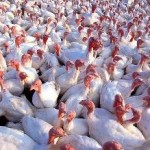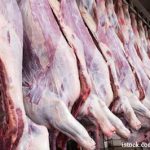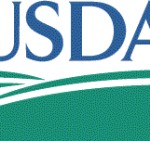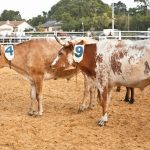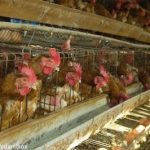New Hampshire, Wyoming, and Nebraska are the latest states to introduce so-called Ag-Gag laws. Those laws make it illegal for activists and journalists to go undercover to expose animal abuse on factory farms. Last year, similar legislation passed in Missouri, Iowa, and Utah, joining North Dakota, Montana, and Kansas as the six states with such laws. The American Legislative Exchange Council (ALEC) developed the Animal & Ecological Terrorisms in America bill as "model legislation" for lawmakers to use when writing these laws. They equate whistle blowing on factory farms with domestic terrorism in which "environmental militants have used violence as a tool to force communities, businesses, local municipalities, and individuals to comport to their views." ALEC also claims that the … [Read more...]
Butterball Employees Won’t be Charged with Animal Abuse
WITN reports that a district attorney in North Carolina will not bring charges of animal cruelty against Butterball employees who were secretly taped allegedly "stomping and kicking" turkeys. Mercy for Animals, who taped and released the video, called this decision troubling. The prosecutor, Ernie Lee, stated that he could not prove beyond a reasonable doubt that the animal cruelty was "malicious or egregious in nature." The individual workers, however, could still be fired. One year ago, Mercy for Animals released another video which resulted in a raid at the plant. Dr. Sarah Mason, director of animal programs in North Carolina's agriculture department poultry division, allegedly tipped off a vet at the Butterball facility about the raid. She apologized for her actions in January … [Read more...]
Butterball Statement on Abuse Allegations
Food Poisoning Bulletin received a statement from Butterball regarding the new video that surfaced, allegedly showing more abuse of turkeys at their plant. It states: "Butterball is aware of the video released today by Mercy for Animals, and we take any allegations of animal mistreatment very seriously. As has been our long-standing policy, we have a zero tolerance policy for animal abuse. Any employee found to have violated our animal care and well-being guidelines, as well as any employee who witnessed abuse and failed to report it, will be terminated. Butterball's guidelines are based on guidelines developed by the National Turkey Federation that have been approved by animal well-being experts including Dr. Joy Mench at the University of California-Davis, Dr. Janice Swanson from … [Read more...]
Turkey Abuse Allegedly Recorded at Butterball Plant
Last year, an undercover video taped by Mercy for Animals allegedly found animal abuse and cruelty at a Butterball turkey facility. At that time, Butterball said it had a "zero tolerance policy for any mistreatment of our birds." Now, another video has surfaced, detailing more alleged violence and cruelty to the birds. The video seems to shows workers kicking and stomping on birds, birds suffering and slowly dying because of no medical attention, and workers dragging the birds by their fragile wings and necks. According to the makers of the video, it was recorded at a Butterball turkey facility. Butterball is the world's largest producer of turkey meat, putting about 30% of the United States' Thanksgiving turkeys on the table. Dr. Greg Burkett, the North Carolina State University … [Read more...]
Central Valley Meat Is Back On Lunch Trays
Central Valley Meat, which was ordered to suspend operations for one week in August after a video showing animal cruelty at its slaughterhouse went viral, has been re-approved for participation in the school lunch program. While experts agree that there was animal cruelty at the slaughterhouse, inspectors from the U.S. Agriculture Department's (USDA's) Food Safety and Inspection Service’s (FSIS) concluded that no food safety violations occurred. Central Valley was quietly readmitted to the school lunch program at the end of August. In the memo, FSIS also states that it "concluded its evaluation of the extensive corrective action plan submitted by Central Valley Meat Company to correct recent humane handling violations and has permitted Central Valley Meat to resume processing. As a … [Read more...]
Central Valley Meat Says It’s Reopened For Business
One week after an undercover video prompted the U.S. Department of Agriculture (USDA) to suspend operations at Central Valley Meat in Hanford, Calif., for what it described as "disturbing evidence of inhumane treatment of cattle," the company says it is reopened for business. "Sunday afternoon, the USDA informed us that it has accepted our action plan and we are free to reopen. With the announcement of that decision, Central Valley Meat will resume operations Monday morning and welcome our employees back to work," the statement said. "We have worked closely with both inspectors and industry experts while developing our USDA-approved action plan. As a result, Central Valley Meat will provide better training for our workers, better monitoring of our facilities, and more frequent … [Read more...]
Republican Legislators Ask USDA to Reopen Central Valley Meat
Three Republican legislators from California have written to the USDA, asking them to reopen Central Valley Meat Company, which was closed this week for egregious abuse of animals. The facility was closed after an undercover video shot by Compassion Over Killing showed downed animals being repeatedly shot with bolt guns and abused. The facility is closed while the USDA investigates the abuse and whether any of the downer animals entered the nation's food supply. The letter states that the legislators want the facility reopened "in order to relieve the plight of its hard-working employees who need to provide for their families." Devin Nunes, Kevin McCarthy, and Jeff Denham all signed the letter. Nunes said that the video was "posted by extremists who are actively working to undermine … [Read more...]
USDA Bought Beef From Central Valley Meat for School Lunch Program
Records from the USDA's Agricultural Marketing Service show that the government bought more than 21 million pounds of beef from Central Valley Meat last year. The farm was shut down this week for inhumane treatment of cows. The beef was used in federal nutrition programs such as the National School Lunch Program, community food banks, and distribution on Indian reservations. Central Valley Meat slaughters older dairy cows which have lost value as producers of milk. The disturbing video was shot undercover by Compassion Over Killing, a nonprofit group dedicated to ending animal abuse, especially to animals in agriculture. The video shows cows vomiting from stress, unable to walk, being hoisted by ropes, and being repeatedly shot with bolt guns (cows must be killed with a single shot … [Read more...]
USDA Suspends Central Valley Meat for Inhumane Cattle Treatment
The USDA is suspending Central Valley Meat (CVM) in Hanford, California after the nonprofit group Compassion Over Killing recorded an undercover video showing workers mistreating animals. The facility is immediately suspended and can no longer slaughter or process food, and government inspectors have been withdrawn. Their mark of inspection has been suspended. The video is extremely disturbing. Central Valley Meat has provided meat to the National School Lunch Program in the past. It also supplies In-N-Out Burger, which has severed ties with CVM. Former USDA inspector and supervisor Dr. Lester Friedlander stated, "I could not believe the repeated Humane Slaughter Violations that occurred. The company should be held accountable for these violations." The government is investigating … [Read more...]
Senators Introduce Bill to Set Hen Treatment Standards
Senator Dianne Feinstein (D-CA) and six other senators have introduced S. 3239, a bill that would codify regulations on hen treatment standards. The measure also sets standards for egg labeling. The states have their own standards for labeling, and these differences prevent some egg producers from selling their eggs in other areas. In January 2012, the Humane Society of the United States and the United Egg Producers reached an agreement to improve the living conditions of egg-laying hens. That agreement would double the chicken's living space to 116 square inches, require that all of the animals have a natural environment so they can sit on perches and scratch, and end the practice of withholding food and water to extend the laying cycle. The restrictive living conditions can help … [Read more...]

